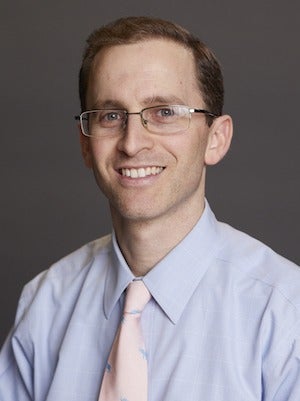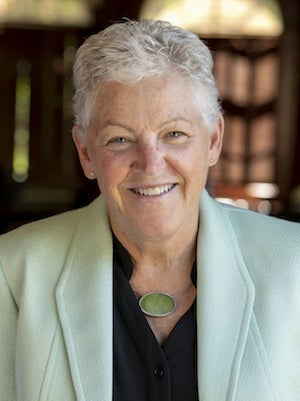January 22, 2021 – Two faculty members from Harvard T.H. Chan School of Public Health—Sara Bleich and Benjamin Sommers—and one former faculty member, Gina McCarthy, have been chosen for roles in the new Biden-Harris administration.
The appointments for Bleich and Sommers were announced January 20, shortly after the inauguration of President Joe Biden. McCarthy’s appointment was announced in mid-December.

Bleich, professor of public health policy in the Department of Health Policy and Management, will serve in the new position of senior advisor for COVID-19 in the Office of the Secretary of the U.S. Department of Agriculture (USDA). In that role, she’ll lead efforts related to the pandemic, economic recovery, and federal nutrition assistance programs.
Bleich previously served as a White House Fellow from 2015 to 2016, working as a senior policy advisor in the USDA’s Office of the Under Secretary for Food, Nutrition, and Consumer Services. Speaking about the importance of her new role, she said, “COVID-19 is a public health crisis, an economic crisis, and a growing hunger crisis which has laid bare racial and social inequities. The U.S. Department of Agriculture is central to the federal response for each of these crises.” Bleich is excited “to work with very talented staff and appointees to meaningfully address the pandemic.”
In addition to her role at Harvard Chan School, Bleich is also the Carol K. Pforzheimer Professor at the Radcliffe Institute for Advanced Study and a member of the faculty at the Harvard Kennedy School. Her research provides evidence to support policies to prevent obesity and diet-related diseases, particularly among high-risk populations. For example, she has published studies on the health impacts of sugar-sweetened beverage taxes, on connections between chain-restaurant advertising and obesity in adults, and on how to modify SNAP (Supplemental Nutritional Assistance Program) policies to promote population health. Bleich has also written or co-authored a number of media articles in recent months on how the COVID-19 pandemic is affecting food security and nutrition in the U.S. Bleich holds a BA in psychology from Columbia and a PhD in health policy from Harvard.

Sommers, Huntley Quelch Professor of Health Care Economics, will serve as deputy assistant secretary for planning and evaluation (ASPE) in the Department of Health and Human Services (HHS). In that role, he will lead the Office of Health Policy, which addresses issues related to Medicaid, the Affordable Care Act, Medicare, health care quality, and public health, including COVID-19. His role will be to ensure that policies are based on solid evidence and science.
“With the COVID-19 pandemic, a recession and threats to health insurance coverage for millions, and ongoing unacceptable racial and ethnic disparities in the U.S. health care system, the work that the Department of Health and Human Services will be doing for the next four years is perhaps more critical than ever,” said Sommers. “I’m honored and thrilled to be chosen for this position, but well aware of the incredibly hard work ahead.”
Sommers previously served as a senior advisor in the Office of the ASPE from 2011 to 2012 and in a part-time advisory role from 2013 to 2016.
In addition to his faculty position at Harvard Chan School, Sommers is a practicing primary internist and a professor of medicine at Brigham and Women’s Hospital and Harvard Medical School. A health economist, his main research interests are health policy for vulnerable populations, the uninsured, and the health care safety net. Some of Sommers’ recent studies, for example, have focused on the health impacts of Medicaid expansion and on work requirements for Medicaid recipients. Sommers has been quoted widely in the media and has written many articles of his own. One of his recent articles highlighted the importance of the Affordable Care Act in preventing people from losing health insurance during the COVID-19 pandemic. Sommers holds two Harvard degrees—a PhD in health policy and an MD.

McCarthy, who previously served as director and chair of the board of advisors for Harvard Chan School’s Center for Climate, Health, and the Global Environment (Harvard Chan C-CHANGE), will serve as the first-ever national climate advisor.
In her new role, McCarthy—who has been a leading voice on climate and environmental issues for more than 30 years—will head the newly formed White House Office of Domestic Climate Policy, where she will drive an “all of government” approach to combating climate change.
At a mid-December event when her appointment was announced, McCarthy said that Biden “has put together the strongest climate plan ever raised to this level of leadership,” and that she welcomed the opportunity to help “communities that have been systematically disadvantaged for years.”
At Harvard Chan School, McCarthy led Harvard Chan C-CHANGE from January 2018 to January 2020 and served as chair of its board of advisors until recently. She was also a professor of the practice of public health in the Department of Environmental Health. Since January of last year, she has served as president and CEO of the Natural Resources Defense Council. Prior to coming to Harvard Chan School, she led the Environmental Protection Agency (EPA) under President Obama. In that role, she spearheaded efforts to curb greenhouse-gas emissions from power plants and vehicles. Before taking the top post at the EPA, she served as assistant administrator for the agency’s Office of Air and Radiation.
At the state level, McCarthy has served as commissioner of the Connecticut Department of Environmental Protection, deputy secretary of the Massachusetts Office of Commonwealth Development, and undersecretary of policy for the Massachusetts Executive Office of Environmental Affairs. In Massachusetts, she advised five governors on environmental affairs, worked at the state and local levels on critical environmental issues, and coordinated policies on economic growth, energy, transportation, and the environment. McCarthy holds a master’s degree in environmental health engineering and planning and policy from Tufts University and a bachelor’s in social anthropology from the University of Massachusetts Boston.
In an email to the Harvard Chan School community, Dean Michelle Williams wrote, “We will greatly miss the presence of Ben and Sara at Harvard Chan School. But it is extremely comforting to know that they, along with Gina, will be hard at work helping shape policy on food and nutrition, health care, and climate at a time when our nation desperately needs strong leadership grounded in science. They’ll be doing the work that all of us in the field of public health aspire to do: translate evidence-based policy into action to improve health for all.”
photo of Capitol: iStock
